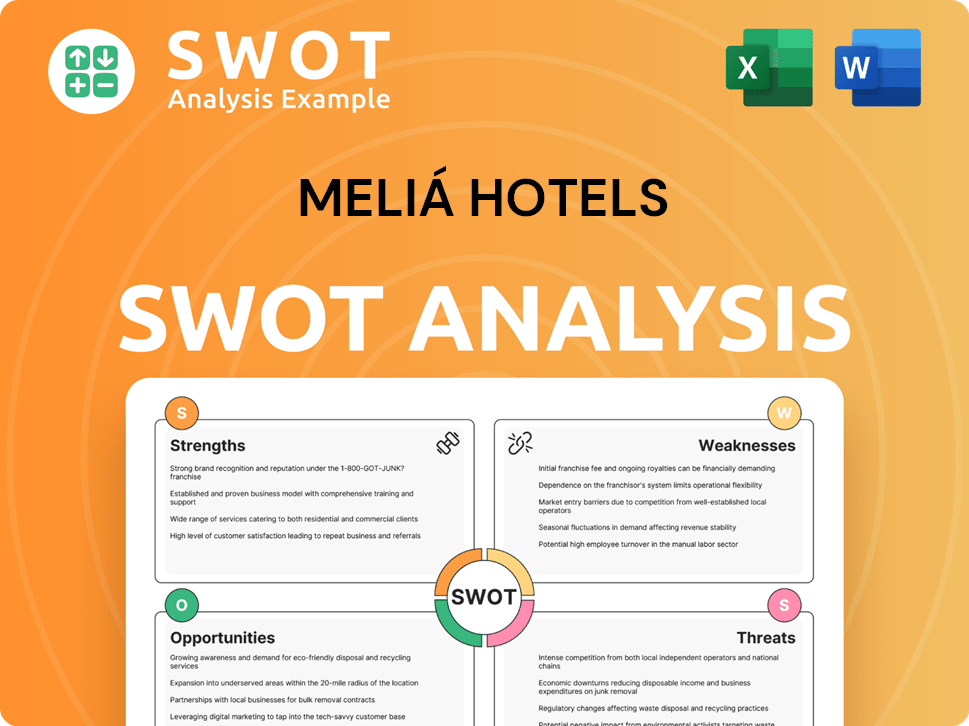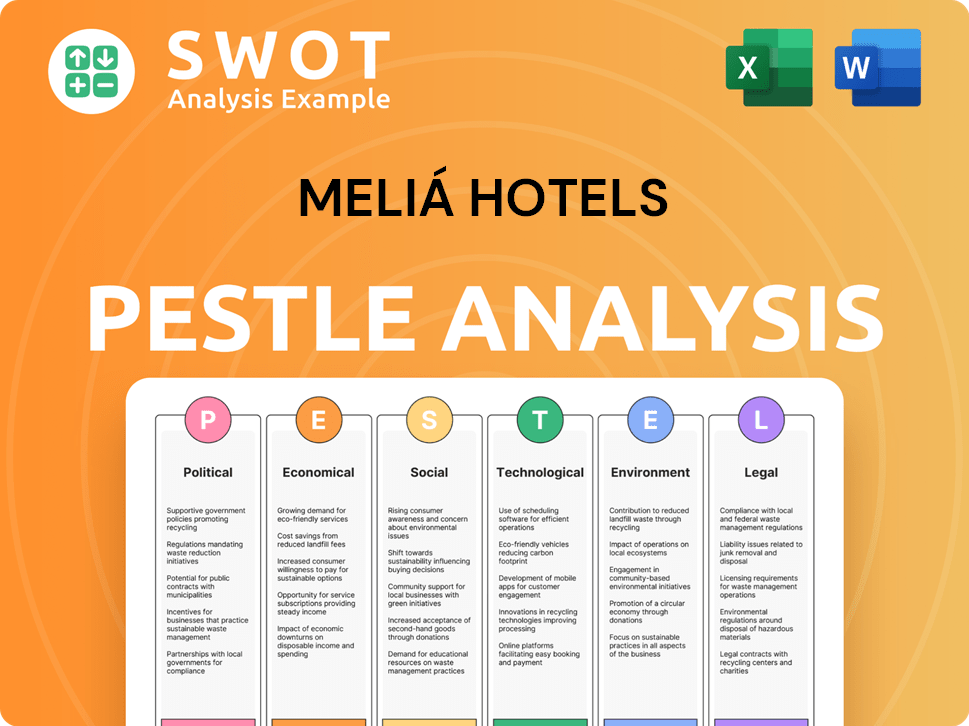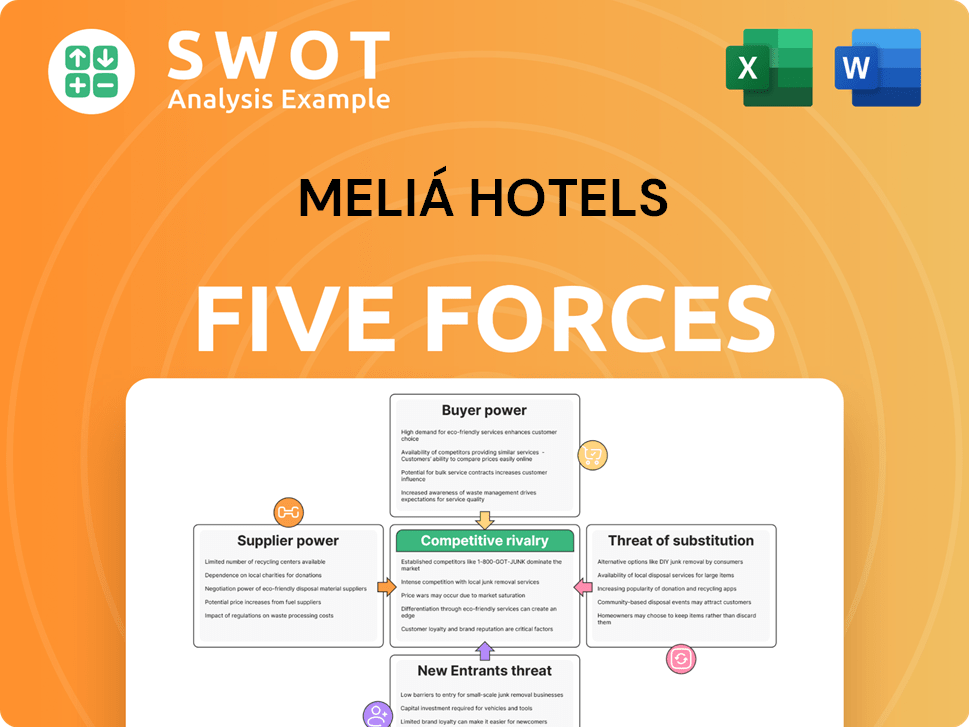Meliá Hotels Bundle
Who Really Controls Meliá Hotels International?
Unraveling the ownership of Meliá Hotels International is key to understanding its strategic direction and future prospects. This isn't just about identifying shareholders; it's about grasping the forces shaping one of the world's largest hotel chains. From its humble beginnings in Mallorca to its global presence today, Meliá's ownership story reveals a fascinating evolution. Understanding the Meliá Hotels SWOT Analysis is crucial for investors.

This exploration into Meliá Hotels ownership delves into the company's history, tracing its roots back to its founder, Gabriel Escarrer Juliá. We'll examine the shifts in Meliá Hotels management and the influence of its major stakeholders. Discover the ownership structure, key shareholders, and how these factors impact the company's performance and strategic decisions in the competitive global hospitality market. Learn more about the Meliá Hotels parent company and its impact.
Who Founded Meliá Hotels?
The story of Meliá Hotels International begins in 1956, with its foundation by Gabriel Escarrer Juliá. This marked the start of a journey that would transform a single hotel into a global hospitality giant. The initial ownership structure of the company was straightforward, with Escarrer Juliá at the helm.
Escarrer Juliá, a visionary entrepreneur from Mallorca, Spain, launched the company with the acquisition of his first hotel, the Altair, in Palma de Mallorca. The company was then known as Hoteles Mallorquines. This early phase was characterized by the founder's direct control and the reinvestment of profits to fuel growth.
During its inception, Meliá Hotels ownership was entirely private. There were no external equity splits or early investors. The company's expansion was driven by the founder's vision and the reinvestment of early profits. This approach allowed for swift decision-making and a unified strategic direction.
The initial ownership of Meliá Hotels was entirely private, with Gabriel Escarrer Juliá holding complete control.
Gabriel Escarrer Juliá's leadership was crucial in shaping the company's early strategic direction and service quality.
The company's early growth focused on organic expansion through the acquisition and development of hotels within Spain.
Swift decision-making was a key advantage due to the founder's complete control.
The founder's control allowed for a strong emphasis on service quality and brand consistency.
Early agreements centered on internal financial management and property acquisition terms.
The early years of Meliá Hotels Company owner were marked by a clear vision and singular control. This approach facilitated the establishment of a strong foundation for future growth. The emphasis on service quality and brand consistency, driven by the founder's direct influence, set the stage for Meliá's expansion. For more insights into the company's strategic initiatives, you can read about the Growth Strategy of Meliá Hotels.
Meliá Hotels history began with Gabriel Escarrer Juliá in 1956, who founded the company and held complete ownership initially. The early focus was on expanding the hotel portfolio within Spain. The founder's control enabled swift decision-making and a strong emphasis on service quality, which laid the groundwork for Meliá's future success.
- The company's initial growth was fueled by reinvesting profits.
- The founder's vision shaped the company's strategic direction.
- The ownership structure allowed for a unified brand experience.
- Early agreements focused on internal financial management.
Meliá Hotels SWOT Analysis
- Complete SWOT Breakdown
- Fully Customizable
- Editable in Excel & Word
- Professional Formatting
- Investor-Ready Format

How Has Meliá Hotels’s Ownership Changed Over Time?
The ownership structure of Meliá Hotels International has evolved significantly since its inception. A pivotal moment in its history was the Initial Public Offering (IPO) in 1996. This transition from a privately held entity to a publicly traded company marked a fundamental shift, allowing access to public capital markets for international expansion. While specific initial market capitalization details from the 1996 IPO are not readily available in recent public data, the listing opened the door for institutional investors and individual shareholders to acquire stakes, influencing the company's strategic direction and governance.
The evolution of Meliá Hotels' ownership reflects its growth and adaptation to the global market. The presence of institutional investors and the ongoing influence of the founding family shape its strategy. The company's commitment to transparency and corporate governance is evident in its public filings and shareholder communications, providing insights into its ownership structure and financial performance. The company's journey, from its origins to its current status as a publicly traded entity, highlights its resilience and adaptability in the competitive hospitality industry. The Growth Strategy of Meliá Hotels has been significantly impacted by these ownership shifts.
| Key Event | Impact on Ownership | Date |
|---|---|---|
| Founding of the company | Private ownership, family control | 1956 |
| Initial Public Offering (IPO) | Transition to public ownership, access to capital markets | 1996 |
| Ongoing Shareholder Activity | Fluctuations in ownership percentages, influence of institutional investors | Ongoing |
The Escarrer family, through various holding entities, remains the largest shareholder in Meliá Hotels International, maintaining substantial control. As of the end of 2023, the Escarrer family, primarily through Inversiones Almenara S.L., held a significant portion of the company's share capital. Beyond the founding family, major stakeholders include institutional investors like mutual funds and asset management firms. The company's annual reports and SEC filings provide detailed breakdowns of major shareholders. For example, as of December 31, 2023, the company's annual report would typically list shareholders with more than 3% of the share capital.
Meliá Hotels' ownership structure has evolved significantly over time, transitioning from private to public ownership.
- The Escarrer family remains the largest shareholder, maintaining significant control.
- Institutional investors play a key role in the company's shareholder base.
- The IPO in 1996 was a pivotal moment, enabling access to public capital.
- Ownership changes impact strategy and corporate governance.
Meliá Hotels PESTLE Analysis
- Covers All 6 PESTLE Categories
- No Research Needed – Save Hours of Work
- Built by Experts, Trusted by Consultants
- Instant Download, Ready to Use
- 100% Editable, Fully Customizable

Who Sits on Meliá Hotels’s Board?
The Board of Directors of Meliá Hotels International significantly influences the company's direction, blending family representation, major shareholder interests, and independent oversight. As of early 2025, the board typically includes executive directors from the Escarrer family, representing the founding ownership, and independent directors who bring external expertise and ensure corporate governance best practices. Gabriel Escarrer Jaume, the current CEO, holds a prominent position on the board, directly representing the family's interests. Other family members may also hold executive or non-executive director roles.
The presence of independent directors on the board serves to balance the influence of the controlling family. These independent directors are tasked with representing the interests of all shareholders and ensuring sound corporate governance. The company's governance framework, as outlined in its annual corporate governance report, details the composition of its board committees (e.g., Audit and Control Committee, Appointments and Remuneration Committee), which are often chaired by independent directors to enhance objectivity and accountability in decision-making processes. The balance of power on the board, with the Escarrer family's significant influence tempered by independent oversight, shapes the company's strategic direction and ensures a degree of stability while also considering broader shareholder interests.
| Board Member | Position | Notes |
|---|---|---|
| Gabriel Escarrer Jaume | CEO | Represents family interests |
| Independent Directors | Various | Oversee corporate governance |
| Family Members | Executive/Non-Executive | Contribute to strategic decisions |
The voting structure of Meliá Hotels International generally adheres to the one-share-one-vote principle. However, the significant ownership stake held by the Escarrer family, primarily through their holding company Inversiones Almenara S.L., grants them substantial voting power. This concentrated ownership effectively provides the family with outsized control, allowing them to significantly influence strategic decisions, board appointments, and key corporate actions, even without special voting rights or golden shares. Their majority or near-majority stake means they can often secure the necessary votes for their proposals. Understanding the Meliá Hotels ownership structure is crucial for investors.
The Escarrer family, through Inversiones Almenara S.L., holds a significant ownership stake, granting them substantial voting power and influence over strategic decisions.
- The board includes family members and independent directors.
- Independent directors ensure corporate governance.
- The one-share-one-vote principle is generally followed.
- The family's stake allows them to influence key decisions.
Meliá Hotels Business Model Canvas
- Complete 9-Block Business Model Canvas
- Effortlessly Communicate Your Business Strategy
- Investor-Ready BMC Format
- 100% Editable and Customizable
- Clear and Structured Layout

What Recent Changes Have Shaped Meliá Hotels’s Ownership Landscape?
Over the past few years (2022-2025), the ownership of Meliá Hotels International has remained relatively stable, with the Escarrer family maintaining a significant controlling stake. The company has focused on strategic financial moves, such as managing debt and optimizing its capital structure, which subtly affects its shareholder base. Industry trends, like increased institutional ownership, are also relevant for Meliá. Large asset managers and institutional investors regularly adjust their positions based on market dynamics and company performance.
The hospitality sector sees ongoing mergers and acquisitions. While Meliá has expanded its portfolio through management agreements and property acquisitions, it hasn't been the subject of a major takeover. Leadership continuity, particularly with Gabriel Escarrer Jaume as CEO, provides stability. Public statements about future ownership changes are limited unless there are plans for significant capital raises or large-scale mergers. The company's focus remains on operational performance and strategic expansion within its existing ownership framework, as detailed in Brief History of Meliá Hotels.
| Aspect | Details | Data |
|---|---|---|
| Ownership Stability | Escarrer family's controlling stake | Significant, no major shifts |
| Institutional Ownership | Influence of large asset managers | Adjustments based on market performance |
| Strategic Focus | Sustainable growth and digitalization | Ongoing initiatives |
The current ownership structure of Meliá Hotels reflects a commitment to long-term stability. The Escarrer family's continued influence, combined with strategic financial management, positions the company to navigate the dynamic hospitality landscape. As of early 2025, there are no major announcements regarding privatization or significant changes to the ownership structure.
The primary ownership of Meliá Hotels is held by the Escarrer family. They maintain a substantial controlling stake, ensuring their continued influence over the company's strategic direction. This structure provides stability in a fluctuating market.
Besides the Escarrer family, institutional investors and asset managers are significant stakeholders. Their investment decisions are influenced by market performance and the overall outlook of the hospitality sector. These stakeholders often adjust their positions based on company-specific news and financial data.
Meliá Hotels has focused on strengthening its financial position in recent years. This includes managing debt and optimizing its capital structure. These activities can subtly impact the shareholder base. The company's financial strategies are designed to support long-term growth and stability.
The company's strategic focus is on sustainable growth, digitalization, and optimizing its brand portfolio. No major shifts in the fundamental ownership structure are expected. The company is concentrating on operational performance and strategic expansion within its current framework.
Meliá Hotels Porter's Five Forces Analysis
- Covers All 5 Competitive Forces in Detail
- Structured for Consultants, Students, and Founders
- 100% Editable in Microsoft Word & Excel
- Instant Digital Download – Use Immediately
- Compatible with Mac & PC – Fully Unlocked

Related Blogs
- What are Mission Vision & Core Values of Meliá Hotels Company?
- What is Competitive Landscape of Meliá Hotels Company?
- What is Growth Strategy and Future Prospects of Meliá Hotels Company?
- How Does Meliá Hotels Company Work?
- What is Sales and Marketing Strategy of Meliá Hotels Company?
- What is Brief History of Meliá Hotels Company?
- What is Customer Demographics and Target Market of Meliá Hotels Company?
Disclaimer
All information, articles, and product details provided on this website are for general informational and educational purposes only. We do not claim any ownership over, nor do we intend to infringe upon, any trademarks, copyrights, logos, brand names, or other intellectual property mentioned or depicted on this site. Such intellectual property remains the property of its respective owners, and any references here are made solely for identification or informational purposes, without implying any affiliation, endorsement, or partnership.
We make no representations or warranties, express or implied, regarding the accuracy, completeness, or suitability of any content or products presented. Nothing on this website should be construed as legal, tax, investment, financial, medical, or other professional advice. In addition, no part of this site—including articles or product references—constitutes a solicitation, recommendation, endorsement, advertisement, or offer to buy or sell any securities, franchises, or other financial instruments, particularly in jurisdictions where such activity would be unlawful.
All content is of a general nature and may not address the specific circumstances of any individual or entity. It is not a substitute for professional advice or services. Any actions you take based on the information provided here are strictly at your own risk. You accept full responsibility for any decisions or outcomes arising from your use of this website and agree to release us from any liability in connection with your use of, or reliance upon, the content or products found herein.